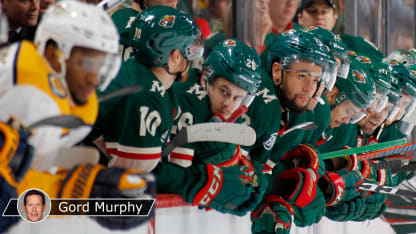The Coaches Room is a regular feature throughout the 2018-19 NHL season by one of four former NHL coaches and assistants who will turn their critical gaze to the game and explain it through the lens of a teacher. David Marcoux, Paul MacLean, Don Nachbaur and our latest addition, Gord Murphy, will take turns providing insight.
In this week's edition, Murphy, former assistant with the Columbus Blue Jackets, Florida Panthers and Philadelphia Flyers, breaks down how coaches handle the playoff push in the final days of the season, especially with teams that are on the bubble and fighting to get into the Stanley Cup Playoffs.
Managing physical, mental states of players crucial during playoff race
Murphy discusses how coaches understand, handle needs of individuals, group when pressure increases

By
Gord Murphy / Special to NHL.com
Everybody focuses on the standings at this time of the season, with the Stanley Cup Playoffs right around the corner.
Players, coaches, management, fans, media, everybody looks at the standings multiple times a day. The close races and uncertainty create excitement and anticipation that doesn't exist earlier in the season because this is what you play for. The journey, the emotions, the highs and lows of it, the competitiveness of it, that brings your group together, creates an undying bond. Those are the things you remember. And, of course, having success coming out the end of it.
There is, however, a daily challenge for coaches when it comes to the standings and the impact they can have, especially if your team is on the bubble, a point or two in or a point or two out like the Colorado Avalanche, Arizona Coyotes and Minnesota Wild in the Western Conference, the Montreal Canadiens, Columbus Blue Jackets and Carolina Hurricanes in the Eastern Conference.
Their playoffs have already started. How do you manage that when it's still the regular season?
One night you look after your game and you're in, and you feel great. Then, the group of games the next night happens and all of a sudden you're out. It can be challenging emotionally, but as coaches the most important thing you're trying to do is get a feel and a read on your players. Are they maintaining their focus on the task at hand or are they thinking what ifs?
You're looking at that collectively and individually. That, as much as matchups, system play, the small details we need our team to do well to win, is what we're talking about in the coaches room behind closed doors.
The veteran players tend to handle it better than the younger guys, so you think about if your leadership is taking control. Are they doing enough? Do you have to supplement as a coaching staff?
Most players thrive in this environment. This is what they want. They're competitors and they love it when there are big stakes on the line. From that standpoint you don't need to do much motivating as a coach.
Players also love matchups, which is a big key at this time of the year, getting the right players on the ice at the right time against the right opponents. Players love the mano-a-mano aspect of it, so they're motivated by that as well.
But you are trying to control their emotions and making sure they don't get the better of them, which can happen.
For instance, emotions can boil over if they go out in the first period and they give up a quick goal, or when the power play struggles and the crowd gets on them, like what happened to the New York Islanders the other night, when they were being booed on the power play.
You heard Islanders coach Barry Trotz bring that up Sunday, almost plead with the fans to not boo the Islanders in those times because it doesn't help. He brought it up because clearly he felt it had to be addressed because he's trying to give his team every possible advantage.
It's a constant dialogue between the coach to the assistants about making sure the focus is good and the mentality of the team is strong.
Is anybody struggling? Is anybody consumed by the moment? How do the players feel as a group, individually? Do we need to address anything with the team? Do we need to do it in small groups instead of with the big group? Do any of the younger guys need to make sure their minds and emotions are in the right place?
The other thing as coaches you focus on at this time of the season is making sure your players are rested physically and that they're getting enough positive reinforcement, because it makes a difference.
If a team is struggling to score, like the Coyotes did on their four-game road trip last week, when they went 0-3-1 with four goals, it could just be about tweaking one thing, giving the players one focus, maybe on more net-front play or more shots off the rush.
And then emphasize the positive.
There's a lot of negativity out there, especially through social media, and you try to shield that from your players as best you can. That's again where your veteran leadership has to play a big role. The veteran guys can get a good read, better than coaches sometimes, and if they see the younger guys looking down, that's when they need to step in.
It's actually similar as an assistant, because all season you're trying to build more of a bonding relationship with the guys, especially the younger guys, so they can come to you, talk, be open. Those are the lines of communication you work all season on building just for situations like this, if a guy is getting down on himself.
I wouldn't say this is more of a challenging time for coaches, but the stakes are higher, the points feel like they matter more than they do in November, December and January, so you have to make sure your team is in a good place mentally and physically to have success.
That's coaching.

















